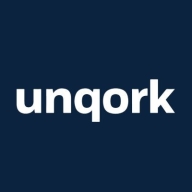

Find out in this report how the two Rapid Application Development Software solutions compare in terms of features, pricing, service and support, easy of deployment, and ROI.
The platform provides default workspaces, and managing or increasing space is easier compared to other platforms.
Using Unqork has resulted in improved cost-saving, time-saving, and resource-saving benefits for our projects.
Two to three projects saw a twenty to thirty percent reduction in workload, indicating a profitable pricing structure.
Regions like Europe, the US, Canada, and India provide very good and immediate support.
Microsoft provides support for a lot of add-on or customized integration requests.
While contacting support is not always a pleasant experience, they attended to our needs satisfactorily.
I rate their technical support as excellent.
The Unqork community portal and academy provide extensive information, with 60 to 70% of required information readily available.
The Unqork community helped integrate features like colored status indicators using JavaScript.
Its cloud infrastructure simplifies global access to data and services without the fear of losing data.
Scalability features like UI and APIs are all available within the same platform, making it easy to handle increased demands.
Not every project can be executed through Unqork as some complex requirements might need proof of concept before proceeding.
This feature allows us to pinpoint very quickly what is happening when an application is not working correctly.
I find Microsoft Azure App Service to be quite stable.
A component's previously set value might be missing the next day, affecting reliability.
The main issue I have with Unqork is the limited availability of learning resources.
There have been no significant stability issues where the entire platform went down.
Deploying Logic Apps in a private network environment becomes complicated due to the extensive white testing and configurations needed at the networking layer.
They should improve the learning curve, enhance documentation, and focus on best practices.
Microsoft's support and technical aspects like installation complexity could use enhancement.
Unqork moved from the Sanctuary to Vega platform without providing a migration tool, necessitating manual updates.
The setup for API calls was initially challenging, especially when dealing with service logs and transforming large JSON codes for validation and PDF generation.
It would be beneficial if they further improved compatibility with both the previous Sencha compiler and the new Vega compiler.
Pricing is a concern.
It is an expensive product, primarily due to the licensing fees.
The price of Microsoft Azure is comparable to Microsoft AWS and Google.
The certification costs are particularly high, around 16,000 Indian Rupees.
The certification costs around $2000, which is ten times the price of UiPath.
In my experience, it seemed somewhat underpriced, possibly due to being an early adopter.
The integration capabilities of Microsoft Azure App Service have greatly enhanced my ability to handle global web operations and support various functions, which were previously challenging without such integration.
The best features of Microsoft Azure App Service are its capacity for scalability, security, and basic support functionalities.
We use the CI/CD inside Azure DevOps and Azure DevOps deploys the applications in Microsoft Azure App Service.
It streamlines operations by automating the process across various departments, allowing cash requests to be raised, reviewed, and approved more efficiently.
Performance-wise, Unqork facilitates connecting and configuring systems synchronously and efficiently.
Unqork allows me to write HTML code, use JavaScript, Angular, and React, which significantly enhances its flexibility.
| Product | Market Share (%) |
|---|---|
| Microsoft Azure App Service | 3.0% |
| Unqork | 1.9% |
| Other | 95.1% |


| Company Size | Count |
|---|---|
| Small Business | 12 |
| Midsize Enterprise | 6 |
| Large Enterprise | 33 |
| Company Size | Count |
|---|---|
| Small Business | 1 |
| Midsize Enterprise | 3 |
| Large Enterprise | 17 |
Microsoft Azure App Service is an HTTP-based mobile application development platform and solution. It is designed to enable organizations to completely control their application development and hosting processes.
Microsoft Azure App Service Benefits
Some of the benefits that come from using Microsoft Azure App Service include:
Microsoft Azure App Service Features
Some of the many useful features Microsoft Azure App Service has to offer include:
When users choose to employ the Microsoft Azure App Service solution, they gain access to many different capabilities. These features include:
Reviews from Real Users
Microsoft Azure App Service’s versatility offers organizations that use it a great deal. It is a very complete, ready-to-use, out-of-the-box mobile development solution that gives users the capabilities that they need to design their mobile applications with the greatest level of ease. In addition, users can employ the cloud to scale operations so that their applications have the proper amount of space to run at the time that they need it.
Andriy L., the Azure practice leader at a computer software company, writes, “I like that it's a ready-to-use, out-of-the-box solution that provides all of the necessary functions for customers, such as codes that can be quickly switched from the production version, or test and DEV versions to production.”
Yasir M., a solution architect at Komatsu, writes, "The best feature is scalability, which allows you to target potential clients worldwide by connecting the application to a local server. This makes the application readily accessible, and the response time will be much better."
Unqork is a no-code application platform tailored for businesses looking to build and manage complex applications without traditional coding. It simplifies app development, enhancing agility and reducing time to market.
Unqork provides a visual development environment that allows businesses to innovate without relying on traditional IT resources, leading to faster deployment and reduced costs. Users can rapidly prototype solutions in a drag-and-drop interface, making it accessible for technical and non-technical stakeholders. The platform boasts strong capabilities in enterprise-grade security, compliance, and scalability, ensuring it's equipped to handle high-demand business applications.
What are the valuable features of Unqork?Unqork finds applications across sectors like finance, healthcare, and insurance, where compliance and scalability are critical. In the financial industry, its robust security features make it ideal for developing secure transactional applications. Healthcare organizations use it to streamline patient data management, while insurance companies leverage it to automate claims processing and underwriting.
We monitor all Rapid Application Development Software reviews to prevent fraudulent reviews and keep review quality high. We do not post reviews by company employees or direct competitors. We validate each review for authenticity via cross-reference with LinkedIn, and personal follow-up with the reviewer when necessary.